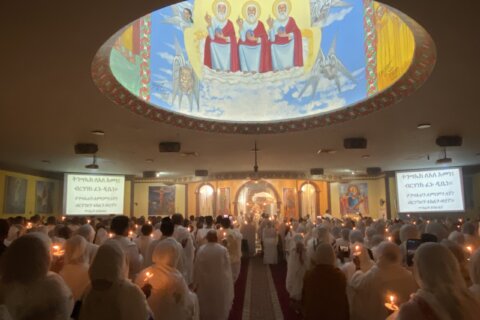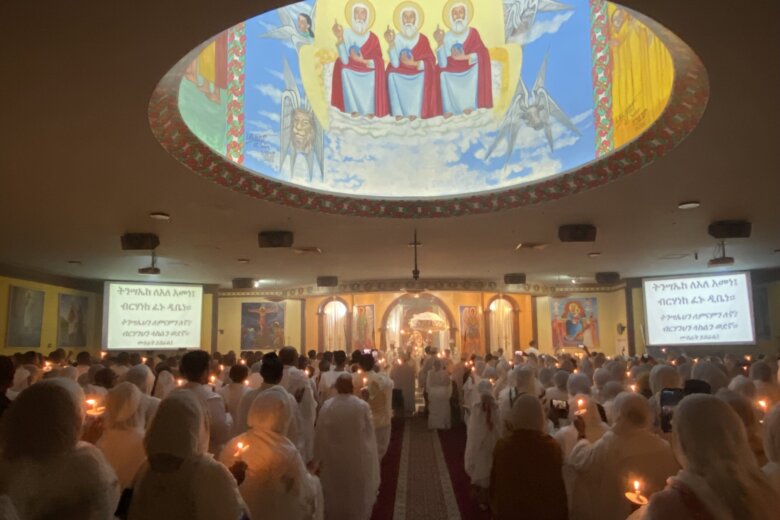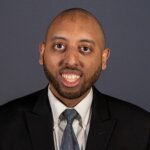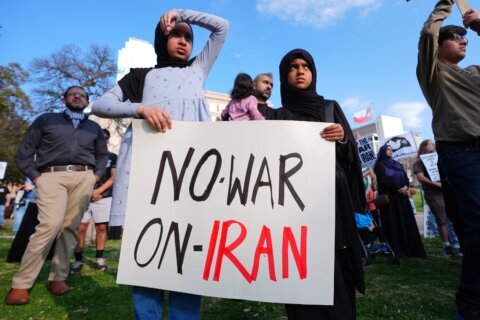
This weekend, Orthodox Christians, including many from the Ethiopian community in the D.C. area, are celebrating Fasika, or Easter, marking the end of the 55-day fast called Abiy Tsome, or the Great Lent.
Ethiopians, along with Eritrean, Greek, Russian and Serbian cultures celebrate the holiday in line with the Julian calendar rather than the Gregorian calendar, which celebrated Easter at the end of March.
Bruktawit Tesfaye, a senior at Capital City Public Charter School in Northwest D.C., said she looks forward to the tradition-filled celebration every year.
Growing up in the tradition
Tesfaye, whose parents immigrated from Ethiopia, has been a mezmuran, or choir singer, at Debre Genet Medhane Alem Ethiopian Orthodox Church, in Temple Hills, Maryland, since she was a child.
Tesfaye said she likes how choir allows her to connect with other people.
“You build a special bond and sisterhood with other mezmurans, or other choir singers,” Tesfaye said, adding that it’s good to be “able to grow up with each other, learn our religion and our culture together” and see “what the future holds all together for us.”

She and her family usually go to their church to take part in the service, which begins Saturday at 6 p.m. and lasts through the early morning hours of Sunday.
During the service, there are prayers, chanting, a candle vigil and the Holy Liturgy — a public ritual of worship.
Tesfaye and the other mezmurans perform a mezmur, or spiritual song. To prepare for this Easter service, she said they practiced reading in Amharic, which is the main Ethiopian language and started singing mezmurs at least two weeks beforehand to perfect it.
She encouraged young children to take part in the service for their personal growth and to make friends.
“As a person who goes to church every Sunday, you just grow to take part in the service. … You will connect with friends outside,” Tesfaye said. “It’s just a bond that you build.”
Kesis Nehemiah Getu, a priest at Debre Genet Medhane Alem, said he is happy to see children taking part in the choir.
“It is really warming to see our children taking over as the first American generation, not only to celebrate Easter but to follow their fathers and forefathers’ steps in celebrating Christianity and Easter; all their involvement in the rituals and the prayers,” Getu said. “It’s really enjoyable.”
Gathering for the big feast
The end of the service signals the end of the 55-day long fast, during which those who observed couldn’t consume meat, dairy products and alcohol.
Ethiopians will go home and eat their special doro wat, which is a spicy chicken stew with boiled eggs, on injera — a sour Ethiopian flatbread — with family members.
It’s a labor-intensive process to make the food as the meal is cooked and prepared days in advance, according to Serkalem Nessibu, a volunteer and member of Debre Genet Medhane Alem for over 30 years and a mother of two children.
Those who volunteer in the church’s kitchen on that day would serve the priests and the deacons telba, which is a flaxseed smoothie, in the church hall after the service ends. The volunteers make the smoothie in the kitchen because some priests and deacons would fast for one to three days before the Easter service ends, Nessibu said.
After that, they would eat the doro wat and other Ethiopian dishes such as alicha wot and dulet, which is made from lamb, and kitfo, which is made of raw beef that’s combined with spices and butter, at home with their families.
Nessibu said it’s important to cook and eat the food because of the long fast.
“Jesus was crucified for us,” Nessibu said. “It is important … because this is the biggest holiday for Orthodox Christians.”
It’s also one of Tesfaye’s favorite holidays because of “the eating after fasting, and just family getting together at one house.”
Faith in the future
Tesfaye said that the church has played a big role in her life, a place that feels like family.
“It really helped me like the Amharic classes … being able to communicate with my friends and family members,” she said. “And then also just taking the other step into going to a world where I have to hold on to my own beliefs.”
Tesfaye will be attending George Washington University this fall on a full scholarship after being selected as part of the university’s Stephen Joel Trachtenberg Scholarship program. She said she plans on using the lessons she learned at Debre Genet Medhane Alem, along with her faith, to guide her through college.
“A bunch of things come your way in college. It’s one of the most difficult times for high school students. Trying to figure out who you are, like who you are as a person, how do you grow?,” Tesfaye said. “Just being able to stick to what I’ve been taught at Debre Genet and being able to use that during my George Washington experience is something that I will do.”
Tesfaye said she plans to return to Debre Genet Medhane Alem again next Easter and throughout her college career.
Get breaking news and daily headlines delivered to your email inbox by signing up here.
© 2024 WTOP. All Rights Reserved. This website is not intended for users located within the European Economic Area.









